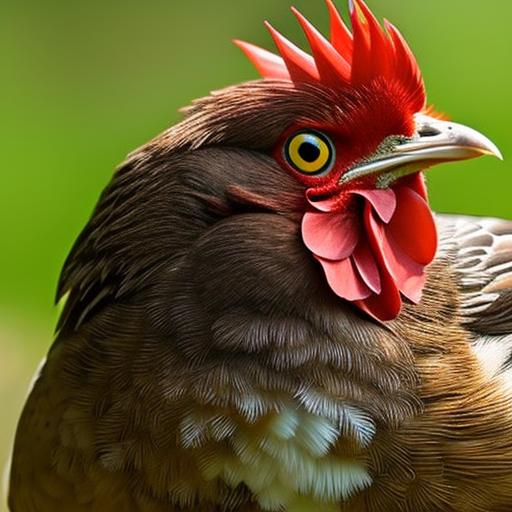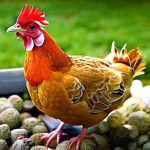Mulching is the process of covering the ground with a layer of organic material, such as straw, hay, wood shavings, leaves, or grass clippings. It is an important practice for chicken coops as it provides numerous benefits for both the chickens and the coop itself. Personally, I have been using mulch in my chicken coop for several years and have seen significant improvements in sanitation, odor control, and overall comfort for my chickens.
Key Takeaways
- Mulching in chicken coops can provide numerous benefits for both chickens and their owners.
- Chickens scratch mulch to create dust baths, which help keep them clean and healthy.
- Mulching can improve soil quality, regulate temperature, and reduce odors and pests in chicken coops.
- Suitable types of mulch for chicken coops include straw, wood shavings, and dried leaves.
- To prevent chickens from scratching and scattering mulch, techniques such as deep litter and using chicken wire can be employed.
Why Do Chickens Scratch Mulch?
Chickens have a natural instinct to scratch at the ground. This behavior serves several purposes in the wild, such as finding food, exposing insects and worms, and creating dust baths. However, when chickens are confined to a coop, their scratching behavior can be harmful. They can dig up and scatter bedding material, creating a mess and exposing bare ground. This can lead to unsanitary conditions and increased risk of disease.
The Benefits of Mulching in Chicken Coops
Mulching in chicken coops offers a wide range of benefits. Firstly, it improves sanitation and hygiene by providing a clean and dry surface for the chickens to walk on. The mulch absorbs moisture from droppings and prevents them from accumulating on the coop floor. This reduces the risk of bacterial growth and helps maintain a healthier environment for the chickens.
Secondly, mulching helps reduce odor and flies in the coop. The organic material absorbs and neutralizes odors, making the coop smell fresher. Additionally, flies are attracted to moist areas where they can lay their eggs. By keeping the coop floor dry with mulch, you can significantly reduce fly populations.
Thirdly, mulching provides insulation and comfort for the chickens. The layer of mulch acts as a barrier between the chickens’ feet and the cold or hot ground. This helps regulate their body temperature and keeps them more comfortable throughout the year.
Lastly, mulching improves soil health and fertility. As the mulch breaks down over time, it adds organic matter to the soil, improving its structure and nutrient content. This can be beneficial if you have a garden or plan to use the coop bedding as compost for your plants.
Types of Mulch Suitable for Chicken Coops
| Type of Mulch | Benefits | Drawbacks |
|---|---|---|
| Straw | Good insulation, absorbs moisture, easy to clean | May contain mold or mites, needs frequent replacement |
| Pine Shavings | Good odor control, absorbs moisture, easy to clean | May cause respiratory issues, needs frequent replacement |
| Hay | Good insulation, absorbs moisture, provides nesting material | May contain mold or mites, needs frequent replacement |
| Sand | Easy to clean, good drainage, reduces odor | May cause respiratory issues, needs frequent replacement, may attract pests |
| Grass Clippings | Good insulation, absorbs moisture, provides nesting material | May contain pesticides or herbicides, needs frequent replacement |
There are several types of mulch that are suitable for chicken coops. Straw is a popular choice as it is affordable, readily available, and provides good insulation. Hay can also be used, but it may contain seeds that can sprout in the coop. Wood shavings are another option, especially if you have access to a local sawmill or woodworking shop. They provide good insulation and absorbency. Leaves and grass clippings can also be used as mulch, but they may break down more quickly and need to be replenished more often.
Mulching Techniques to Prevent Scratching
To prevent chickens from scratching up the mulch, there are several techniques you can use. One method is the deep litter method, where you continuously add fresh bedding material on top of the existing mulch. This creates a deep layer that is more difficult for chickens to scratch through. Another technique is to layer the mulch with wire mesh. Place the wire mesh on top of the mulch and secure it to the ground with stakes or rocks. This creates a barrier that prevents chickens from digging into the mulch.
Using a chicken tractor is another effective way to prevent scratching. A chicken tractor is a movable coop that allows chickens to graze on fresh grass while protecting them from predators. By moving the chicken tractor regularly, you can prevent chickens from scratching up the same area repeatedly.
How to Apply Mulch in Chicken Coops

Applying mulch in chicken coops is a relatively simple process. Start by cleaning out any existing bedding material or debris from the coop. Then, spread a layer of mulch on the floor, aiming for a thickness of about 2-4 inches. Make sure to cover the entire floor, including corners and edges. If you are using the deep litter method, add fresh bedding material on top of the existing mulch every few weeks to maintain a deep layer.
The tools needed for mulching in chicken coops are minimal. A rake or pitchfork can be used to spread and level the mulch. A wheelbarrow or bucket can be used to transport the mulch from the storage area to the coop. Gloves may also be helpful to protect your hands from any sharp objects or debris in the mulch.
Mulching Tips for Different Seasons
Mulching in chicken coops can be adjusted based on the season to provide optimal benefits for your chickens. In the summer, it is important to use a lightweight and breathable mulch, such as straw or wood shavings. This will help keep the coop cool and prevent excessive heat buildup. It is also important to regularly monitor and replace the mulch if it becomes wet or soiled, as this can attract flies and create an unpleasant odor.
In the winter, it is beneficial to use a thicker layer of mulch to provide extra insulation for the chickens. Straw or wood shavings are good options as they provide good insulation properties. It is also important to regularly monitor and replace the mulch if it becomes wet or frozen, as this can create damp conditions that are not ideal for the chickens.
In the spring and fall, it is important to regularly monitor and replace the mulch as needed. These seasons can bring more moisture and changing temperatures, which can affect the condition of the mulch. Regularly turning over the mulch with a rake or pitchfork can help aerate it and prevent any potential issues.
Common Mistakes to Avoid While Mulching
While mulching in chicken coops can provide numerous benefits, there are some common mistakes that should be avoided. Firstly, it is important to avoid using toxic or harmful materials as mulch. Some plants, such as cedar or black walnut, can be toxic to chickens and should not be used as mulch. Additionally, avoid using mulch that has been treated with chemicals or pesticides.
Another common mistake is applying too much or too little mulch. Applying too much mulch can create a damp and compacted environment that is not ideal for the chickens. On the other hand, applying too little mulch may not provide adequate insulation or absorbency. Aim for a thickness of about 2-4 inches and monitor the condition of the mulch regularly.
Lastly, it is important to maintain the mulch regularly. This includes removing any soiled or wet areas and replacing them with fresh mulch. Regularly turning over the mulch with a rake or pitchfork can also help aerate it and prevent any potential issues.
Alternative Methods to Prevent Scratching
If you are unable to prevent chickens from scratching up the mulch, there are alternative methods you can try. One method is to use chicken feeders and waterers that attach to the coop. This prevents chickens from scratching around their food and water sources, keeping the area cleaner.
Another method is to provide chickens with a designated scratching area outside of the coop. This can be a designated patch of dirt or sand where chickens can scratch and dust bathe to their heart’s content. By providing them with an alternative area to scratch, they may be less inclined to scratch up the mulch in the coop.
Conclusion and Final Thoughts on Mulching in Chicken Coops
In conclusion, mulching in chicken coops offers numerous benefits for both the chickens and the coop itself. It improves sanitation and hygiene, reduces odor and flies, increases insulation and comfort for the chickens, and improves soil health and fertility. There are several types of mulch that are suitable for chicken coops, including straw, hay, wood shavings, leaves, and grass clippings. To prevent chickens from scratching up the mulch, techniques such as the deep litter method, layering with wire mesh, or using a chicken tractor can be employed. Mulching in chicken coops can be adjusted based on the season to provide optimal benefits. It is important to avoid common mistakes such as using toxic materials, applying too much or too little mulch, and not maintaining the mulch regularly. If chickens continue to scratch up the mulch, alternative methods such as using chicken feeders and waterers that attach to the coop or providing a designated scratching area can be tried. Overall, mulching in chicken coops is a simple and effective way to improve the health and comfort of your chickens.
If you’re looking for tips on how to keep chickens out of your mulch, you might also be interested in this article on choosing the right size door for your chicken coop. Having the right size door can help prevent chickens from escaping and getting into areas where they shouldn’t be, such as your mulch beds. Check out the article for more information on how to ensure your chicken coop is secure and your chickens stay where they belong.
FAQs
What is mulch?
Mulch is a layer of material, such as leaves, straw, or wood chips, that is spread over soil to help retain moisture, suppress weeds, and regulate soil temperature.
Why do chickens like to scratch in mulch?
Chickens are natural foragers and enjoy scratching in mulch to search for insects, seeds, and other small creatures to eat.
What problems can chickens cause in mulch?
Chickens can cause several problems in mulch, including scattering it around the yard, digging up plants, and creating bare spots in the soil.
How can I keep chickens out of my mulch?
There are several ways to keep chickens out of mulch, such as using physical barriers like fencing or netting, providing a designated foraging area, or using chicken-proof mulch materials like rocks or gravel.
What are some chicken-proof mulch materials?
Chicken-proof mulch materials include rocks, gravel, sand, and shredded rubber. These materials are less attractive to chickens and can help deter them from scratching in the mulch.
Can I train my chickens to stay out of the mulch?
Yes, you can train your chickens to stay out of the mulch by providing a designated foraging area, using positive reinforcement, and consistently redirecting them away from the mulch.
Meet Walter, the feathered-friend fanatic of Florida! Nestled in the sunshine state, Walter struts through life with his feathered companions, clucking his way to happiness. With a coop that’s fancier than a five-star hotel, he’s the Don Juan of the chicken world. When he’s not teaching his hens to do the cha-cha, you’ll find him in a heated debate with his prized rooster, Sir Clucks-a-Lot. Walter’s poultry passion is no yolk; he’s the sunny-side-up guy you never knew you needed in your flock of friends!







